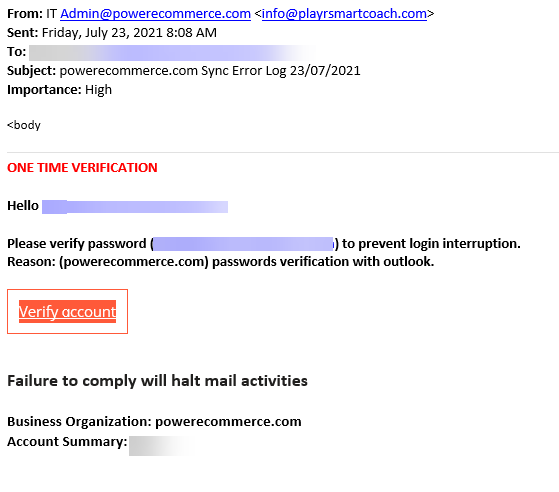WARNING fake email asking for Please verify password or ONE TIME VERIFICATION DO NOT CLICK ON THE LINK or answer the email.
We are taking steps to have the senders Servers shut down and IP addresses banded from the major service providers. Above is a screenshot of the email that is being sent.
What is Phishing?
Phishing is the most common tactic employed by hackers, as it requires the least amount of effort and generally preys on the less cyber-aware. In fact, the FBI estimates that more than $1.75 billion was lost to business email scams like phishing in 2019. It's also the most common way for organizations to be exposed to ransomware. Phishing can take many forms, and the following email can be used to brief your organization on some of the common ways that phishers target companies:
Thanks again for helping to keep our network, and our people, safe from these cyber threats.
Please let us know if you have any questions.
Regards,
Bill Vargas
CEO/CTO Power eCommerce, Inc.
We�ve outlined a few different types of phishing attacks to watch out for:
What You Can Do To avoid these phishing schemes, please observe the following email best practices:
- Phishing: In this type of attack, hackers impersonate a real company to obtain your login credentials. You may receive an e-mail asking you to verify your account details with a link that takes you to an imposter login screen that delivers your information directly to the attackers.
- Spear Phishing: Spear phishing is a more sophisticated phishing attack that includes customized information that makes the attacker seem like a legitimate source. They may use your name and phone number and refer to a business you use in the e-mail to trick you into thinking they have a connection to you, making you more likely to click a link or attachment that they provide.
- Whaling: Whaling is a popular ploy aimed at getting you to transfer money or send sensitive information to an attacker via email by impersonating a real company executive. Using a fake domain that appears similar to ours, they look like normal emails from a high-level official of the company, typically the CEO or CFO, and ask you for sensitive information (including usernames and passwords).
- Shared Document Phishing: You may receive an e-mail that appears to come from file-sharing sites like Dropbox or Google Drive alerting you that a document has been shared with you. The link provided in these e-mails will take you to a fake login page that mimics the real login page and will steal your account credentials.
What You Can Do To avoid these phishing schemes, please observe the following email best practices:
- Do not click on links or attachments from senders that you do not recognize. Be especially wary of .zip or other compressed or executable file types.
- Do not provide sensitive personal information (like usernames and passwords) over email.
- Watch for email senders that use suspicious or misleading domain names.
- Inspect URLs carefully to make sure they�re legitimate and not imposter sites.
- Do not try to open any shared document that you�re not expecting to receive.
- If you can�t tell if an email is legitimate or not, please send a copy to us at [email protected]
- Be especially cautious when opening attachments or clicking links if you receive an email containing a warning banner indicating that it originated from an external source.


